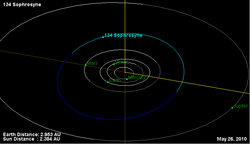Astronomy:134 Sophrosyne
 Orbital diagram | |
| Discovery | |
|---|---|
| Discovered by | Karl Theodor Robert Luther |
| Discovery date | 27 September 1873 |
| Designations | |
| (134) Sophrosyne | |
| Pronunciation | /soʊˈfrɒsɪniː/[1] |
| Named after | sophrosyne |
| Minor planet category | Main belt |
| Orbital characteristics[2] | |
| Epoch 31 July 2016 (JD 2457600.5) | |
| Uncertainty parameter 0 | |
| Observation arc | 138.60 yr (50625 d) |
| |{{{apsis}}}|helion}} | 2.86280 astronomical unit|AU (428.269 Gm) |
| |{{{apsis}}}|helion}} | 2.26311 AU (338.556 Gm) |
| 2.56295 AU (383.412 Gm) | |
| Eccentricity | 0.11699 |
| Orbital period | 4.10 yr (1498.7 d) |
| Average Orbital speed | 18.54 km/s |
| Mean anomaly | 229.885° |
| Mean motion | 0° 14m 24.76s / day |
| Inclination | 11.6018° |
| Longitude of ascending node | 345.986° |
| 84.7156° | |
| Earth MOID | 1.31034 AU (196.024 Gm) |
| Jupiter MOID | 2.42537 AU (362.830 Gm) |
| TJupiter | 3.396 |
| Physical characteristics | |
| Dimensions | 108[2] 112.188 km[3] |
| Mass | 2.0×1018 kg |
Equatorial surface gravity | 0.0345 m/s2 |
Equatorial escape velocity | 0.0652 km/s |
| Rotation period | 17.190 h (0.7163 d)[4] |
| Geometric albedo | 0.0364±0.001[2] 0.0436 ± 0.0122[3] |
| Physics | ~174 K |
| C (Tholen)[3] | |
| Absolute magnitude (H) | 8.76,[2] 8.770[3] |
Sophrosyne (minor planet designation: 134 Sophrosyne) is a large main-belt asteroid that was discovered by German astronomer Robert Luther on 27 September 1873, and was named after the concept of sophrosyne, Plato's term for 'moderation'. Classified as a C-type asteroid, it has an exceedingly dark surface and most probably a primitive carbonaceous composition.[citation needed]
An occultation of a star by 134 Sophrosyne was observed 24 November 1980, in the United States. Timing information from this event allowed a diameter estimate of 110 km to be derived.[5] Photometric observations of the asteroid in 2015 produced a lightcurve indicating a rotation period of 17.190±0.001 h with a variation amplitude of 0.28±0.01 in magnitude. This provided a good match to the only previous determination in 1989.[4]
References
- ↑ Noah Webster (1884) A Practical Dictionary of the English Language
- ↑ 2.0 2.1 2.2 2.3 Yeomans, Donald K., "134 Sophrosyne", JPL Small-Body Database Browser (NASA Jet Propulsion Laboratory), https://ssd.jpl.nasa.gov/sbdb.cgi?sstr=134, retrieved 12 May 2016.
- ↑ 3.0 3.1 3.2 3.3 Pravec, P. et al. (May 2012), "Absolute Magnitudes of Asteroids and a Revision of Asteroid Albedo Estimates from WISE Thermal Observations", Asteroids, Comets, Meteors 2012, Proceedings of the conference held May 16–20, 2012 in Niigata, Japan (1667), Bibcode: 2012LPICo1667.6089P.
- ↑ 4.0 4.1 Pilcher, Frederick (October 2015), "Rotation Period Determination for 134 Sophrosyne, 521 Brixia and 873 Mechthild", The Minor Planet Bulletin 42 (4): 280–281, Bibcode: 2015MPBu...42..280P.
- ↑ Taylor, G. E., "Progress in accurate determinations of diameters of minor planets", Asteroids, comets, meteors; Proceedings of the Meeting, Uppsala, Sweden, June 20–22, 1983: pp. 107–109, Bibcode: 1983acm..proc..107T.
External links
- 134 Sophrosyne at AstDyS-2, Asteroids—Dynamic Site
- 134 Sophrosyne at the JPL Small-Body Database
 |

